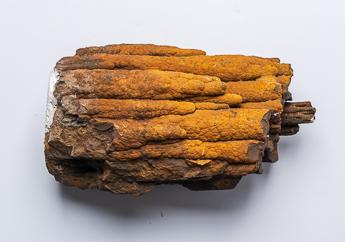Missouri Geological Survey Director: Carey Bridges, RG
Limonite (hydrous iron oxide, FeO(OH)•nH2O) is a heavy, yellowish-brown to dark brown group of iron oxide minerals of variable composition. It commonly forms as a weathering product of other minerals containing iron. Limonite usually has a dull luster and may vary in hardness from chalky or clay-like to almost that of steel. It has a distinctive yellowish-brown streak.

Limonite was once mined as iron ore in south-central Missouri where large boulders, discontinuous beds, nodules and clay-like masses of the mineral are associated with cherty residual clay. Much of the limonite found in Missouri originally formed as pyrite or marcasite, then was chemically changed (by weathering) to limonite; such limonite specimens often contain small remnants of the original pyrite or marcasite.
The mineral is common throughout the Ozarks, where it occurs as scattered lumps and boulders in stream gravels and on hillsides.
Visit the department’s Ed Clark Museum of Missouri Geology, where you will find limonite on display.
Nothing in this document may be used to implement any enforcement action or levy any penalty unless promulgated by rule under chapter 536 or authorized by statute.
For more information
Geological Survey Program
Missouri Geological Survey
P.O. Box 250
Rolla, MO 65402-0250
United States
